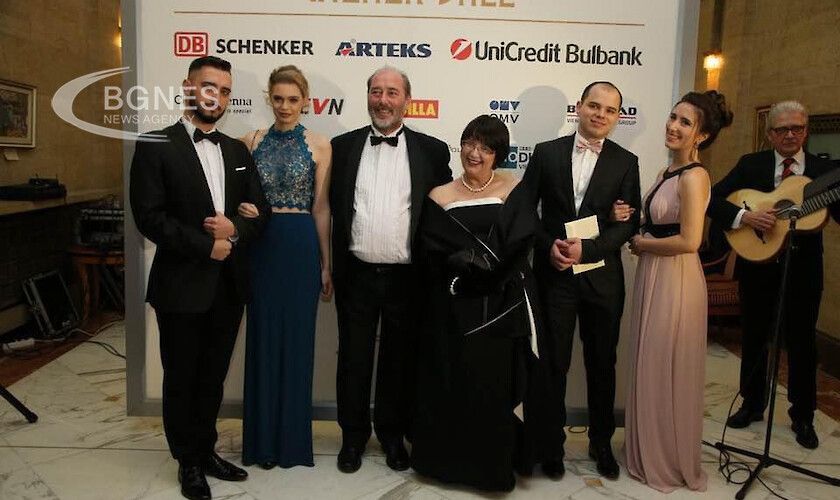Marianna Hill: Bulgarian programmers and IT specialists are in high demand in the UK
Bulgarian programmers and IT specialists are in high demand in the UK. Bulgarians are capable and happy to be hired by companies abroad. Bulgarian ladies are more successful in business because they are more resilient. That's what Marianna Hill, a very experienced translator and founder of Marianna Hill's Interpretorium, said on the morning block of BGNES in English.

"Bulgarian businesses in the UK are a relatively new thing. The first ones emerged about 30 years ago. Bulgarian companies in sectors that are traditionally well-developed abroad are struggling with Bulgaria's image and product quality. Under communism, Bulgaria specialised in the agricultural, IT and food sectors in the Council for Mutual Economic Assistance (CMEA). Heavy industry, which was very popular then, was very underdeveloped. After the changes, only the IT sector survived. Bulgarian companies in this sector are profitable. Bulgarian programmers and IT specialists are in great demand in other countries. In my second homeland, the UK, they are very sought after. In other sectors, such as the food industry, Bulgaria maintains the good tradition," said Marianna Hill.
According to her, the only problem is that companies do not want to have anything to do with their homeland because, unfortunately, Bulgaria's image is not very good. For example, food companies in Bulgaria, which sell to over 40 countries, will avoid any "trace" of where the food comes from. Sure, it mentions where the product is from, but the focus is not the place of origin.
"Unfortunately in the EU agriculture is highly regulated and Bulgarian companies have difficulties with quotas, exports and the restrictions that the EU imposes everywhere in the union. Also subsidies and programmes, unfortunately, only contribute to corruption in Bulgaria. The money that Brussels gives limits the entrepreneurial aspirations of every Bulgarian farmer to produce and export abroad in relation to their capabilities. It is the Bulgarians who have exported agricultural produce to Europe in the 20th century. There have been many farmers who have gone all over Europe to gain and give experience. Now subsidies have the effect of driving corruption simply because it is not money that has been earned, but simply given. So it becomes very easy to lie and bribe for personal gain. This is not very productive," she said.

Hill also commented on the impact of the Bulgarian diaspora abroad on business.
"The Bulgarian diaspora helps with this by showing that Bulgarians are capable. My experience shows that Bulgarians are gladly hired by companies abroad. The problem comes from the fact that Bulgarians were prisoners in their own country. This led to the constant thought, that the grass is always greener on the other side of the fence. That's why so many people left the country when the "fence" came down. Purely for economic reasons, people leave to live better. However, this does not always happen. Now the Bulgarian diaspora is at a point where it is looking for excuses for its own bad decisions," Hill said.
She shared her opinion on Brexit and whether it was a mistake.
"Like everything in life, nothing is ever only negative or only positive. I accepted Brexit, that's the democratic spirit, more people wanted out of the EU. Of course there are pros and cons of membership. As I pointed out subsidies and how they can harm Bulgaria. It is not always wonderful. There are difficulties everywhere not just in Britain. Some people are deluded others think they are worse off now than before Brexit. Recent research shows that for Brits the difficulties are not from Brexit but from Covid. Most are happy with the exit from the EU. I don't think Brexit in particular is to blame for the island's crisis."
In that spirit, Hill expressed skepticism about further departures from the EU, especially if Brussels makes an effort to show the positives of the union.
"There are always tensions in international relations, that is the essence of diplomacy. However, there is democracy. If say more Hungarians want out of the EU, they are free to leave whenever they want. That is not a bad thing, it is important to be realistic and not attack the EU or Brexit indiscriminately. We need to look at the pros and cons. If Brussels show more pros of the EU, there will be no Brexit in Hungary. Of course when people are scared and poor, which happens more often lately, people are more likely to go into extreme nationalist moods, they will say "We don't need the others". This is not true, because thanks to the EU there has been unprecedented peace in the member states for 70 years," she stressed.
She is not convinced that AI will replace the need for professional translators and suggests that the technology is already at its zenith.
"No one is irreplaceable, the cemetery is full of irreplaceable people. Joking aside, AI is a good thing and there is no denying that it's the future. There is a tension now between artificial and natural intelligence. There is a petition to stop the development of AI. It can replace regional translations to a certain extent and has already been done. However, with this a new profession of post-editor is emerging to edit what the machine has done. The EU has made and paid a lot of money for translation software that is available to all languages in the EU. The idea is for a machine to translate texts for the administration. The problem is that it is not very good. I am curious how bio-computers will develop. I think AI has reached its limit. Translators who were worried that machines would replace them can now be post-editors. New professions have been created. I'm optimistic, manual translation was the first thing to go with AI. Now bio-computers are being developed and are making great progress, I look forward to seeing their capabilities. This raises a question for the developers around the morality of this venture. The human mind is not just math, there are ethics and morals."
Hill also shared why she sees the women as being more successful in business.
"Without trying to avoid sexism. Women are more successful because its harder for them. It takes more work because they are assumed to be the 'prettier' part of the world, which is not true. We need to fight the idea of "oh, she's fragile and needs protection". All over the world in family relationships, the woman becomes the breadwinner. We ladies, "cost less" and mothers work because it is more convenient for the employer to pay less, so many men raise the children. In the end gender doesn't matter, it's been proven. Intellect and skill matter. Bulgarian ladies in business are more successful because they are more resilient and patient. In business relationships it is very important to show off when you need to. Women have a good sense of this," she concluded. /BGNES




